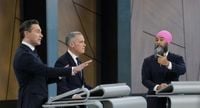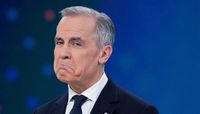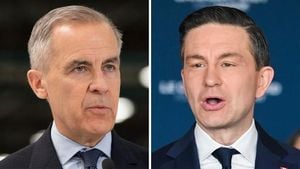In a heated debate that took place on April 17, 2025, Canadian Prime Minister Marc Carney defended his trade strategy, asserting that the removal of internal trade barriers would provide greater benefits to Canadians than the tariffs imposed by U.S. President Donald Trump. Carney criticized Trump’s ongoing trade war, promising to initiate trade discussions with the Trump administration if he secures victory in the upcoming elections on April 28, 2025.
Carney, who has taken the helm of the Liberal Party following Justin Trudeau's resignation amid political pressures, emphasized that dismantling internal trade barriers would significantly bolster the Canadian economy. "We can give ourselves much more than Donald Trump can take away from us. We can maintain one economy. That is within our reach," Carney stated during the debate.
As the election date approaches, the stakes are high for Carney and his party. Recent polls indicate that the Liberals are leading the Conservatives by five points, a notable shift from January when they trailed by 27 points. Analysts attribute this surge in support to the growing discontent with Trump’s policies, which have stirred up nationalist sentiments among Canadian voters.
Conservative Party leader Pierre Poilievre has been vocal in his opposition, urging voters to reject a fourth consecutive term for the Liberals. He argues that Canada cannot afford to continue under Liberal leadership, especially with rising costs of housing, food, and uncontrolled immigration. "You can’t solve the housing crisis with the same people who caused it. We cannot afford a fourth Liberal term amid soaring housing costs," Poilievre claimed.
The debate showcased a stark contrast between the two leaders’ visions for Canada’s future. Poilievre accused the Liberals of being anti-energy, claiming they have stifled the development of pipelines and hindered national prosperity. He promised that a Conservative government would repeal what he termed "anti-energy laws," streamline bureaucratic processes, and cut taxes to stimulate investment and resource development.
Conversely, Carney defended his administration’s record, asserting that a modern economy must focus on transformation and innovation rather than solely relying on fossil fuels. He argued that the future lies in embracing change and adapting to new economic realities.
The debate also highlighted the evolving relationship between Canada and the United States, particularly under Trump’s administration. Carney acknowledged that the economic relationship has fundamentally changed, citing tariffs and trade restrictions as significant challenges. However, he expressed his intention to adapt and engage in formal trade discussions with the Trump administration if re-elected.
The political landscape is further complicated by rising public support for the Liberal Party, which has seen a resurgence in light of Trump’s policies. Carney’s ability to maintain this momentum leading up to the election will be crucial in determining the outcome.
As both parties ramp up their campaigns, Carney is expected to focus on themes of economic unity and cooperation among provinces, while Poilievre continues to emphasize the cost of living and the legacy of the Liberal government. With less than two weeks until voters head to the polls, Canadians are closely watching to see who will lead them through an uncertain economic landscape and a volatile relationship with Washington.
The Nanos Research poll released on April 17, 2025, reflects a significant change in public opinion, showing the Liberals now ahead of the Conservatives by five points. This marks a dramatic turnaround from earlier in the year, when the Liberals were lagging by a substantial margin. Political analysts suggest that this shift may be linked to the public’s reaction to Trump’s policies and the resulting increase in support for the Liberals.
Both candidates are aware of the importance of these final days of campaigning. Carney aims to solidify his position as a leader focused on economic cooperation, while Poilievre seeks to capitalize on any lingering frustrations with the current government. The outcome of the April 28 elections will not only determine the future of Canada’s leadership but also how the nation navigates its complex relationship with the United States and the broader global economy.
As the debate concluded, the question remained: Can Carney sustain the momentum of public support, or will Poilievre’s criticisms resonate with voters? The next few days will be critical as both parties make their final appeals to the electorate, shaping the future of Canada in an ever-changing political landscape.





